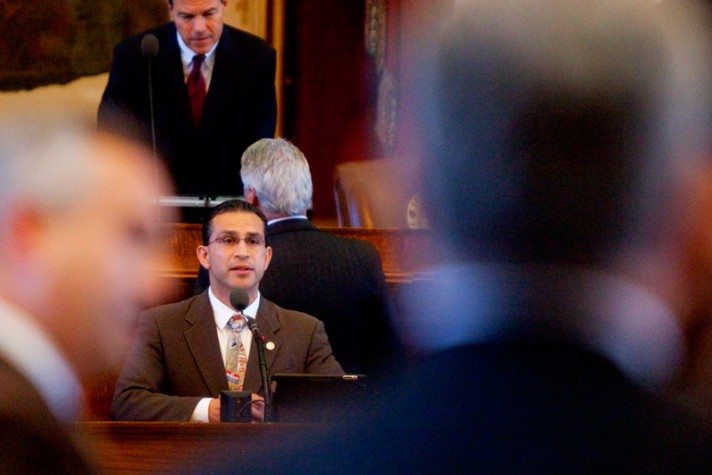This piece is both about Texas backing off of testing while simultaneously backing down from its more rigorous curriculum that helps students to be college ready— that is, four years of high school math, science, language arts and social studies. It's analog is California's a-g curriculum that prepares students for entrance into the University of California system.
The rationale is to give students more "choice." However, given that access to choice options within the curriculum together with choice itself varies by race, class, and other factors like being able to access the curriculum because you speak the language and understand the culture of the school and district, this direction in policy will predictably and unfortunately continue to stratify opportunities and outcomes within our public school system. Accordingly, the closing quote by a at Texas high school student is quite appropriate:
“If they are allowed the option to not take a harder math class, of
course they’re not going to do that,” said Anthony Tomkins, 18, a senior
at Akins who plans to attend Texas A&M. “So forcing it upon us in
the long run is actually a good thing.”
It goes to show that many of our students do know what is up; and the struggle for equity continues.
-Angela
Texas Considers Backtracking on Testing

Students
at Akins High School in Austin. The principal, Daniel Girard, said he
worries that if the state cuts back on standards, “some adults may not
push kids on the potential that is there when it’s not required by the
state as a graduation plan.”
Published: April 10, 2013
AUSTIN, Tex. — In this state that spawned test-based accountability in
public schools and spearheaded one of the nation’s toughest high school
curriculums, lawmakers are now considering a reversal that would cut
back both graduation requirements and standardized testing.
In the state that spawned test-based accountability
in public schools, some parents and educators believe it has resulted in
limited flexibility.
The actions in Texas are being closely watched across the country as
many states move to raise curriculum standards to meet the increasing
demands of employers while grappling with critics who say testing has
spun out of control.
The Texas House of Representatives overwhelmingly passed a bill this
month that would reduce the number of exams students must pass to earn a
high school diploma to 5, from 15. Legislators also proposed a change
that would reduce the required years of math and science to three, from
four. The State Senate is expected to take up a similar bill as early as
this week.
The proposed changes have opened up a debate in the state and beyond.
Proponents say teachers will be able to be more creative in the
classroom while students will have more flexibility to pursue vocational
or technically oriented courses of study.
But critics warn that the changes could result in the tracking of
children from poor and minority families into classes that are less
likely to prepare them for four-year colleges, and, ultimately,
higher-paying careers.
“What we all know is when you leave it up to kids and schools, the poor
kids and kids of color will be disproportionately not in the curriculum
that could make the most difference for them,” said Kati Haycock,
president of the
Education Trust, a nonprofit group that advocates for racial minorities and low-income children.
Texas is currently an outlier in both the number of exit exams it
requires students to pass and the number of courses its default high
school curriculum prescribes.
Legislators raised the number of high school exit exams to 15 from 4 in
2007, a year after they passed a law to automatically enroll all high
school students in a curriculum that mandates four years of English,
science, social studies and math, including an advanced algebra class.
(Students may enroll in a less rigorous course of study with the
permission of their parents.)
Texas now requires more than double the number of end-of-course exams
used in any of the eight states that currently mandate that students
pass such exams, according to the
Education Commission of the States.
And only two other states and the District of Columbia set similar
graduation requirements, according to Achieve, a nonprofit organization
that works to upgrade graduation criteria.
Here in Texas, the backlash has been fiercest among parents and
educators who believe testing has become excessive, particularly after a
period when the state cut its budget for education.
On a recent afternoon, Joanne Salazar pulled out a copy of a testing
calendar for the school in Austin where her daughter is a sophomore. “Of
the last 12 weeks of school, 9 are impacted by testing,” Ms. Salazar
said. “It has really started to control the schedule.”
Test critics also argue that standardized tests stifle experimentation
in the classroom. “It turns our schools into these cookie-cutter
manufacturing plants,” said Dineen Majcher, president of
Texans Advocating for Meaningful Student Assessment, a grass-roots group.
Some educators say the tests do not account for students who learn at
different paces. “We expect every student to perform at certain levels
with the same amount of time,” said H.D. Chambers, superintendent of the
Alief Independent School District west of Houston. “That’s
fundamentally flawed.”
But at a time when about half of the students who enroll in community
colleges in Texas require remedial math classes, Michael L. Williams,
the state’s commissioner of education, called the proposed changes “an
unfortunate retreat.”
“What gets tested gets taught,” Mr. Williams said. “What we treasure, we measure.”
Champions of more stringent graduation requirements say they also help
push students — particularly those who do not come from families in
which college attendance is assumed — to achieve at levels they might
not have considered on their own.
Since the tougher recommended curriculum was signed into law, the proportion of Texas high school graduates
taking at least one Advanced Placement exam who were from low income backgrounds rose to 45.3 percent in 2012, from 30.5 percent in 2007.
But some argue that the current recommended curriculum could drive more
students to drop out if they struggle with advanced courses. (The
graduation rate in Texas actually rose from 63 percent in 2007 to 72
percent in 2011, the most recent year for which state education agency
data is available.)
Defenders of the current curriculum come from “the elitist in our
society who devalue blue-collar work and believe every student must get a
four-year college degree,” said Daniel Patrick, a Republican senator
from Houston who has sponsored Senate versions of the education bill.
Representative Jimmie Don Aycock, the Republican from
Killeen who sponsored the House bill (which passed 147 to 2), said the
revised curriculum would give students more options, including community
colleges or technical schools. “I don’t want them to have to choose up
or choose down,” Mr. Aycock said, “but choose what’s right for them.”
Some business leaders say that without advanced requirements, students
will not be prepared for the kinds of jobs employers need to fill. “The
jobs of today require higher level skills,” said Bill Hammond, president
of the Texas Business Association.
Josh Havens, a spokesman for Gov. Rick Perry, said the
governor favored a curriculum that required four years of math and
science and “does not support efforts that lessen the accountability and
academic rigor that prepares our students for career and college.”
Senator Leticia R. Van de Putte, a Democrat from San Antonio, said she
was proposing an amendment that would require four years of math and
science, although allow students to substitute more applied courses for
advanced algebra or subjects like physics. “This allows for relevance
and flexibility while maintaining high rigor,” she said.
“It puts more of the onus on the school to make sure that kids are
taking the most rigorous courses possible,” said Daniel Girard,
principal of Akins High School in Austin. With large class sizes and
shrinking budgets for guidance counseling, he said, “some adults may not
push kids on the potential that is there when it’s not required by the
state as a graduation plan.”
One morning last week, several high school seniors, all from low-income
families, gathered in the Akins guidance office beneath dozens of
college pennants hanging from the ceiling.
Nathaniel Buescher, 18, is considering offers from Columbia, Harvard,
the Massachusetts Institute of Technology, Princeton, Stanford, the
University of Texas and Yale. His mother immigrated to the United States
from Mexico without a high school diploma, and his father never
attended college. But his elder sister and brother both advised him to
“take the hardest classes that are available.”
Proponents of the changes in the default curriculum say students can
continue to select the most advanced classes. But those who want to take
math or writing classes geared toward technical careers will be able to
do so.
“There is a fundamental policy disagreement between those that think
kids can’t make choices and will take the easy way out,” said Hector L.
Rivero, president of the Texas Chemical Council and a member of Jobs for
Texas, a coalition of employers and industry trade groups, “and those
of us who believe that kids can make the right choices given the right
support and direction.”
Even some students say, though, that standards help guide their choices.
“If they are allowed the option to not take a harder math class, of
course they’re not going to do that,” said Anthony Tomkins, 18, a senior
at Akins who plans to attend Texas A&M. “So forcing it upon us in
the long run is actually a good thing.”



